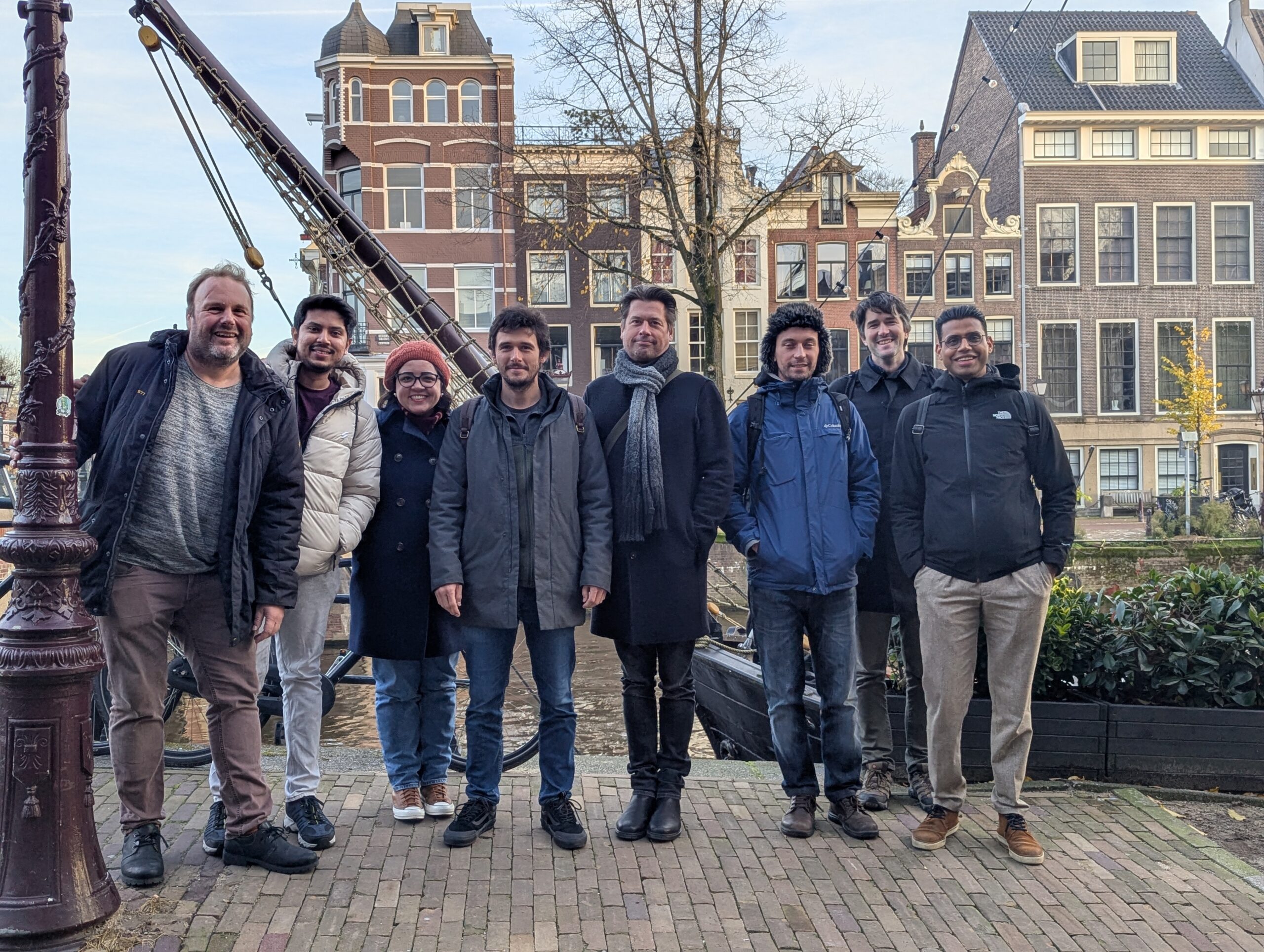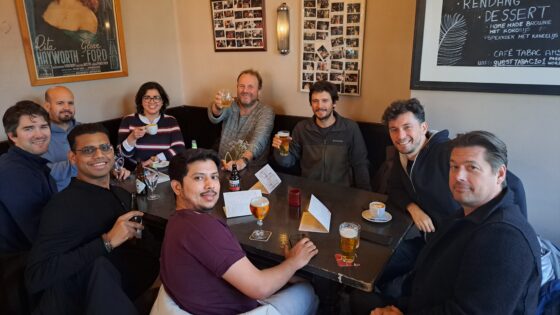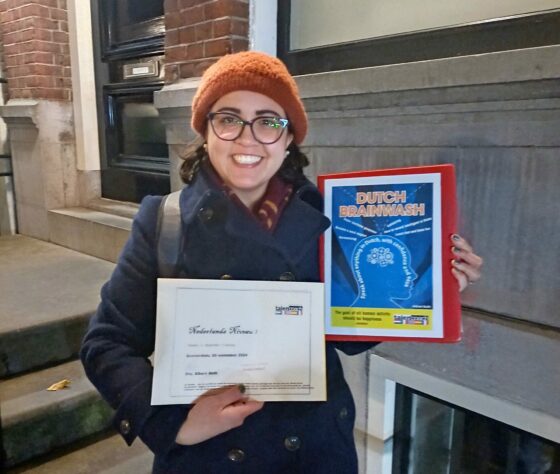Partner content
Frustrated with typical Dutch classes? Try the Dutch Brainwash

When you walk into Albert Both’s casual classroom on Amsterdam’s Keizersgracht, where he’s been teaching internationals how to speak Dutch since 2009, you won’t find any traditional Dutch language textbooks or engage in endless chit chat about the weather.
“Some people are confused by it, they expect something official,” says Albert, also known as Mr. Dutch Brainwash after the one-week intensive Dutch language course he designed using his own method. “But learning happens before you realise it, not when you open a certain book.”
Albert’s courses, with a maximum of eight people at his Talencoach headquarters, are indeed unique. “We sit around a table like a group of friends. My students inspire each other to learn. We create a safe and fun atmosphere, as compared to their past traumatic experiences learning Dutch, which were often impersonal and had students sitting there like they were in a factory. I just want people to talk, which is what they also want.”
Talking points
“We seemed to spend a lot of time discussing Boris Johnson’s various foibles, which, as one of the two ‘Brefugees’ in the class, was amusing,” says 59-year-old Dominic Dibble from Scotland, who moved with his Dutch wife to the Netherlands following Britain’s decision to leave the EU.
“Another student works for Amsterdam City Council, so [Amsterdam mayor] Femke Halsema’s character also received some attention. Albert is not afraid to be a little provocative, but always in a good-humoured way, so you are entertained while learning.”
Albert’s insistence on talking about what’s relevant and interesting to his students is one of the defining features of his successful courses. “I’m only restricted by the words people know and grammar construction, but we can discuss whatever they say,” says Albert.
“I once had a woman from Australia who wrote a book about how to kill yourself, and she gave me a copy,” he continues. “So we had discussions about does your life really belong to you? Are you responsible for your children and partner? We talk in a light way, but we can talk about difficult topics, like the death of parents and illness. Of course, we also talk about the good stuff—new jobs and having babies! But people respond to those kinds of discussions.”
“Speaking about weather and food is also handy,” laughs Dominic. “But it’s good to have conversations about a wide variety of topics that relate more closely to your interests as an adult. That gives you more of a sense of what might be possible as your Dutch skills improve, which acts as a positive incentive.”
Attitude shifts
It’s not only what students talk about, but the way they think about what they’re saying that has been an eye-opener for many. “Speaking about language is about changing your thinking,” says Albert. “If you think in English, Dutch will not be yours. You must become receptive.”
Yong-dae Kim (55) from Japan agrees. He made the four-hour train commute from Groningen to Amsterdam daily to take Albert’s class. “I recommend Albert’s course to anyone who is fed up with traditional Dutch lessons or anyone who crashes into the wall of Dutch learning,” he says.
“However, I don’t recommend this course for anyone who keeps sticking to English, German or their own language and is always learning Dutch in comparison to their own language. Dutch is Dutch, it has its own theory and background that cannot be explained in words.”

Dominic adds that Albert’s focus on an “attitudinal change” to learning was essential to him. “The key improvement for me was more about a shift in my attitude to learning Dutch. Before, I saw it as a rather threatening and overwhelming task. Now, it feels more manageable, exciting and creative, which is partly down to some of the methods Albert uses. This shift in attitude also means I am more willing to immerse myself in Dutch by watching TV (with the Dutch subtitles on!), and to experiment with making useful sentences.”
The methods
In addition to Albert’s homemade curriculum and use of “drawings, stuffed animals, storytelling and jokes,” says Colombian native Yeimy L. Garrido Gallego (33), a lawyer, lecturer and Spanish teacher, it’s his personal methods that have made a huge difference in her learning process.
“He helped me understand that the Dutch language is quite pragmatic, which reflects the Dutch culture I’m familiar with after living here for several years,” she says. “Albert has given names to everything in his method. Those names are funny and very practical, which makes things easy to remember. For example: ‘the LEGO system’, ‘the sentence maker 1.0, 2.0…’, ‘the lazy bastard way of speaking Dutch’ and ‘Anaconda words’.”
“Anaconda words”, explains Dominic, “refer to words that include other words, as if they’ve swallowed them (e.g. verantwoordelijk [responsible], which contains antwoord [answer]). Albert highlights them as words whose meaning you can try to decode by knowing the meaning of the ‘swallowed’ words. I can now recognise and guess at the meaning of ‘anaconda words’ much more easily.”
Dominic says since taking Albert’s course, his understanding of Dutch TV news has gone from some 35% to a whopping 75%.
Mistakes
Guessing—and guessing wrong—is all part of the path to Dutch-learning success insists Albert, whose students describe him as a positive language coach.
“In Dutch, we say ‘to colour within the lines’,” says Albert. “But you must get out of your comfort zone to learn a language. People tend to play it safe. But you need to be adventurous. If it works, it works. If not, you correct it. Mistakes are a sign of intelligence. They reflect your way of thinking.”
“From the beginning, Albert made me feel I was in a safe place where I not only could but was encouraged to make as many mistakes as necessary,” says Garrido Gallego. “He also kept repeating positive and optimistic words and phrases during the course, which greatly impacted me. For example, I remember him telling us daily: ‘You already speak Dutch!’; ‘You know more Dutch than you think!’; ‘You are highly intelligent!’; ‘Keep your goals in mind!’

“He is a real language coach. I thought I was not good enough to speak Dutch, but during the course, my mindset really changed (I got why Albert gave the name of Brainwash to his course, it is a real brainwash—though a quite positive one!).”
Yong-dae Kim, whose Dutch went from an A2/B1 level to a solid B1 after taking the Brainwash course, found Albert’s use of frequently used Dutch expressions (as compared to standard dictionary vocabulary) a game-changer. “He taught us that the Dutch language is driven by its context. This was eye-opening for me to start understating Dutch communication.”
Along the way, students pick up the logic, linguistics, vocabulary, theory and sentence structure that improves their Dutch and motivates them to use it in daily life.
“Once you know how the Dutch language works, where to put the verbs for example, you can do so much more,” says Albert. “You don’t have to memorize everything. And you don’t need 20 rules that will paralyse you!”
Ready to take the plunge? Click here.
Thank you for donating to DutchNews.nl.
We could not provide the Dutch News service, and keep it free of charge, without the generous support of our readers. Your donations allow us to report on issues you tell us matter, and provide you with a summary of the most important Dutch news each day.
Make a donation